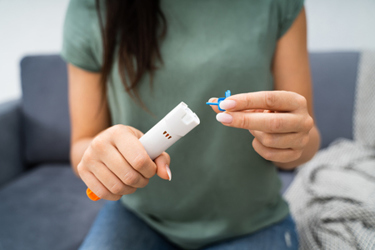Auto-injectors: Global Trends & Market Forecast
By Shalini Nagar, Research Nester

Auto-injectors are smart devices designed to make the process of administering medication easier and more effective. They find application in different medical settings, such as hospitals, clinics, and even homecare. The primary purpose of these devices is to provide patients with a method for self-administering their medication in a safe and efficient manner. In 2021, approximately 50% of the sales of the top 30 bestselling drugs worldwide were attributed to auto-injector delivery formats.
Auto-injectors offer a dependable method for delivering medication, especially during emergency scenarios. Auto-injectors are used in administering epinephrine to individuals experiencing severe allergic reactions like anaphylaxis. Other popular uses are for treating diabetes, rheumatoid arthritis, and multiple sclerosis.
Emerging Trends Expanding Market Size And Growth Rate
The auto-injector market has seen significant growth in recent times and is expected to continue expanding steadily. As per a research report from Research Nester, the size of the auto-injector market is projected to reach $33 billion by the end of 2036, with an annual growth rate (CAGR) of 17% during the forecast period (2024 to 2036). In 2023, the industry size for auto-injectors was $10 billion. The convenience and user friendliness offered by auto injectors have played a role in their rising popularity among both patients and healthcare providers.
Rise In Self-administration Of Medications
The growing trend of self-administration of medications has been fueled by the desire for convenience and personal control in healthcare. More and more patients are looking for ways to self-administer medication rather than relying on healthcare professionals or making trips to facilities. Data from 2021 indicates that the global rate of self-medication ranges from 12% to 94%. By self-administering medications, people can enjoy independence and flexibility in managing their health. A study revealed that people choose home self-injection because it saves them from traveling to facilities (72%), it allows them to inject in the comfort of their own homes (51%), and it ensures privacy (43%).
Technological Advancements In Auto-injectors
The growth of the market has been greatly influenced by the progress made in auto-injector technology. These improvements have enhanced the ease of use, safety, and convenience of auto-injectors, making them readily available and user-friendly for patients.
-
Needle Safety Features: Auto-injectors that incorporate safety measures like needle shields have significantly decreased the likelihood of needlestick injuries, thereby enhancing the overall safety for individuals using them.
-
Electronic Auto-injectors: Electronic auto-injectors that are equipped with sensors and electronic controls offer a precise method for delivering medication, guaranteeing accurate dosing while minimizing the potential for human mistakes. BETACONNECT holds the distinction of being the sole fully electronic auto-injector featuring a concealed needle and integrated injection reminders.
-
Voice and Visual Guidance: Auto-injectors equipped with voice and visual guidance systems offer instructions on how to administer injections correctly, which helps boost user confidence and minimizes the chances of injection errors. This enhanced usability aims to improve self-administration.
-
Customizable Settings: Auto-injectors that offer customizable settings, including the ability to adjust injection depth and speed, provide individuals with personalized injection experiences tailored to their unique preferences and requirements.
-
Smart Features
- Connectivity to Mobile Apps: Auto-injectors equipped with smart features can synchronize with mobile applications, enabling users to conveniently monitor their injections and receive tailored information and guidance. For example, the MyEpiPen app aims to educate individuals about the EpiPen (epinephrine) auto-injector and provide guidance on managing allergic reactions. These mobile applications offer step-by-step instructions on auto-injector usage, timely reminders for medication doses, and alerts regarding potential side effects or interactions with other medications.
- Dosage Tracking: Smart auto-injectors can monitor and record the medication dosage given by the user. This useful feature allows users to maintain a log of their injections, ensuring they are administering the correct amount of medication at the appropriate times. The suggested dosage for children weighing between 15 and 30 kg is 145 µg when using an auto-injector. For adults, the recommended dosage ranges from 300 to 500 µg. The recorded data regarding dosage can be synchronized with an application, offering valuable insights for both users and healthcare professionals regarding the patient’s progress of treatment.
- Reminders: Auto-injectors equipped with smart features can send personalized reminders to individuals, ensuring they take their medication promptly. These reminders can be tailored according to the user’s schedule and preferences. By offering notifications, smart auto-injectors assist users in remaining consistent with their medication routine and enhancing adherence to prescribed treatments.
- Connectivity to Mobile Apps: Auto-injectors equipped with smart features can synchronize with mobile applications, enabling users to conveniently monitor their injections and receive tailored information and guidance. For example, the MyEpiPen app aims to educate individuals about the EpiPen (epinephrine) auto-injector and provide guidance on managing allergic reactions. These mobile applications offer step-by-step instructions on auto-injector usage, timely reminders for medication doses, and alerts regarding potential side effects or interactions with other medications.
Market Segmentation Analysis
By Product Type
Disposable: The disposable auto-injector segment is expected to hold the largest market share of 65% during the forecast period, 2023 to 2035. This growth is expected, due to their single-use design, which makes them simple and convenient for patients to use to administer their medication. It also eliminates the need for manual handling and cleaning, reducing the risk of contamination and infection. Disposable auto-injectors are intended for one-time use and come prefilled with a precise dosage of medication. For example, the BD Physioject disposable auto-injector 1 mL is a user-friendly button-activated auto-injector specifically designed for managing chronic illnesses.
Reusable: Reusable auto-injectors are usually crafted to be sturdy and simple to sanitize, ensuring that patients can utilize them for a duration. This segment is projected to hold significant market share of 35%, owing to the increasing prevalence of chronic illnesses that necessitate daily medication. Additionally, reusable auto-injectors play a role in minimizing waste and reducing environmental impact by eliminating the requirement for disposable plastic components. For instance, the UniSafe auto-injector employs a 1-mL UniSafe safety syringe for delivering medication. The only part that is discarded after usage is the syringe itself, contributing to waste reduction and aligning with sustainability objectives.
By Technology
Manual Auto-injectors: Manual auto-injectors are projected to dominate the market with a 60% share by the end of 2035, primarily due to their widespread availability and affordability. Notably, manual auto-injectors offer compatibility with a range of medications.
Automatic Auto-injectors: Automatic auto-injectors are expected to have a market share of 40% by the end of 2035. These devices are commonly used in emergency situations that require minimal user involvement. One example is the SKYTROFA auto-injector. Due to their higher cost and limited availability, the market share of automatic auto injectors is expected to be smaller than that of manual auto-injectors.
By Route Of Administration
Subcutaneous Route: The subcutaneous route segment is projected to have the highest market share, reaching 58% by 2035. This method of drug delivery is highly effective in introducing medications into the bloodstream. Compared to methods like intravenous or intramuscular injections, it has a lower likelihood of causing side effects. Moreover, subcutaneous injections are often more convenient for patients, as they can administer them themselves at home or in a clinic.
Intramuscular Route: The intramuscular route segment is expected to have a significant market share of 42% by 2035. This route of drug administration is considered effective as it allows for quick absorption and is less invasive compared to intravenous methods. Auto-injectors are becoming more popular for this route, since they don't require any skill or training to use. Intramuscular injections offer the advantage of rapid absorption of medication when compared to alternative methods, resulting in quicker therapeutic effects. This method can handle quantities of medication, making it appropriate for drugs that necessitate higher dosages. Additionally, these injections provide a release of medication ensuring stable blood levels over an extended duration.
Key Market Players And Competitive Landscape
The auto-injector industry is highly competitive, with several key market players driving growth and innovation, including Eli Lilly, Scandinavian Health, AbbVie, Amgen, Owen Mumford, Ypsomed, Biogen Idec, Mylan, Pfizer, Sanofi, Stevanato Group, and Teva Pharmaceuticals. These companies play a crucial role in the development and distribution of auto-injector devices. Some of the product launches are:
- UDENYCA is the pegfilgrastim product that provides patients with two options: a prefilled syringe and an auto-injector. Additionally, an on-body injector (OBI) is currently being reviewed by the FDA.
- The Auvi-Q device by Kaléo is designed to be compact and comes with voice-guided instructions. It includes a needle and is preloaded with epinephrine, which can be used for emergency treatment in cases of severe allergic reactions.
- Teva Pharmaceuticals recently introduced an auto-injector device for AJOVY (fremanezumab-vfrm). AJOVY is specifically designed to prevent migraines in adults and stands out as the preventive migraine treatment that offers both quarterly (675 mg) and monthly (225 mg) subcutaneous dosing options, targeting the anti CGRP (calcitonin gene related peptide) pathway.
Future Outlook
In the future, it's likely that auto-injectors will be combined with devices like smartwatches or fitness trackers. This integration would allow for real-time health monitoring and personalized dosing recommendations. Additionally, upcoming auto-injectors will come equipped with connectivity features. They'll be able to sync with apps or cloud-based platforms to keep track of usage, provide reminders, and facilitate communication with healthcare professionals. Moreover, as technology continues to advance, auto-injectors will become more advanced. They'll be capable of delivering personalized doses based on needs and health conditions. These advancements are expected to improve the effectiveness of treatments and enhance patient adherence.
Conclusion
The progress made in auto-injector technology has brought about a transformation in the healthcare industry by giving patients an effective method to self-administer medication. These advancements have fueled the market for auto-injectors. Moreover, the miniaturization of these devices has made them more portable and discreet, making it easier for patients to carry them around and take their medication in a variety of situations. This has greatly improved the quality of life for individuals with medical conditions by enabling them to stick to their treatment routine even while on the move.

About The Author:
Shalini Nagar is a content associate at Research Nester Pvt. Ltd.
